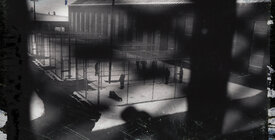Mothers, daughters, sisters, wives: over 2,000 women holding these titles resided with me at Michigan’s only prison for women: the Women’s Huron Valley Correctional Facility. There, we were packed into cells — some holding as many as 16 women at a time.
In the Midwest, severe storms are a regular occurrence. Have you ever experienced a Wi-Fi interruption or cell service outage? Do you remember how frustrating it was not being able to connect to the outside world? Could you imagine if your only source of information, even under the best of circumstances, was cable news? That’s the difficult situation that I and so many others experienced in prison. Prison is like a town that has been hit by a massive storm, only the damage is permanent.
And it doesn’t stop there. The place I lived in for nine years, the place that some women were sentenced to die in, was not designed with our gender in mind. Basic necessities such as some feminine hygiene products, had to be purchased. Mothers visiting with their children sometimes had to endure the termination of their bonding time because the visiting room was overcrowded. Expecting mothers had to walk to the chow hall in rain, sleet, snow, or hellish heat along with the rest of us. Imprisoned men do not have to endure our particular female misery.
One morning, while chatting with a dear friend who was incarcerated on a murder charge in the death of her abusive husband, the subject of sentencing disparities between men and women came up. My friend said, “If I had been a man who’d killed his wife, I’d have an out date.” (An “out date” is essentially the day you are able to leave prison.) My friend is serving life without parole. Others joined our conversation, and, before I knew it, we all had come to the conclusion that women are sentenced more harshly than men.
Now, I recognize that as true as it may have felt to us, data does not support my friend’s assertion. An oft-cited study from the National Coalition Against Domestic Violence showed that while the average prison sentence of men who kill their female partners is between 2 and 6 years, women who kill their partners, on average, are sentenced to 15 years. But that study was published more than 30 years ago, and more recent studies have not been able to replicate these results. In fact, after the implementation of standardized guidelines in 1992, sentencing disparities between men and women began to erode. There is little evidence to show that women who kill their intimate partners are sentenced more harshly than men who commit the same crime.
I went back to my own cell to dwell on our morning talk. I had stayed mostly mum during our earlier conversation. I didn’t feel like I had been harshly sentenced. I knew that with my violent crime I could have — and some would argue, should have — been sentenced to die in prison. In the midst of a mental health crisis, I had turned violent, and took the life of a loved one. As a result, I was sentenced to 9 to 30 years of incarceration. The question I asked myself was, “Had I been treated more harshly than a man would have been in similar circumstances?”
But was that really a material question? While in prison, I spent countless hours listening to the stories of women who had killed, stolen, struggled with addiction, and suffered from mental health issues. They all — we all — had been thrown away. We were all losing time we’d never get back. The men, we thought, got to do their short time and get back to life as they knew it. Now I see that this was not the case: we were all suffering equally under the same excessive system of punishment.
I was released from prison on October 9, 2018. Because I had tried to do everything right — to become a “model prisoner” and to do a great deal of self-work — I was able to walk out of prison exactly nine years after I went in. I was stronger, healthier, and ready for the world. However, my personal growth was not the result of the institution but of the time I spent in therapy and self-reflection. I wish I could say that I came out an expert on incarceration, rehabilitation, and remediation, but that knowledge didn’t come until later. When I left, I was still grappling with the experience and the issues that had affected me so deeply. One in particular nagged at me: there are women who did not commit a crime nearly as violent as mine who are serving more time than I did. I still struggle with this survivor’s guilt. Why and how did I get so lucky as to not be spending the rest of my life locked away in a cage?
Shortly after my return home, I began working for The Bail Project, a nonprofit organization whose mission to end cash bail is succinctly captured in its motto: "Freedom should be free.” I also spent time working closely with the Detroit Justice Center, learning about how to create the world I wanted to live in — one that is more just and equitable and where freedom can truly be attained by everyone. I realized that the question of who has it worse in prison — men or women — has been beside the point all along. What is more important is the sad truth that too many are more willing to build prisons than to dismantle the conditions which fill them.
Angela Davis said, “Prisons do not disappear social problems, they disappear human beings. Homelessness, unemployment, drug addiction, mental illness, and illiteracy are only a few of the problems that disappear from public view when the human beings contending with them are relegated to cages.” As one of those people who was relegated to a cage, I know firsthand that prisons do not work. America has a tragic obsession with vengeance and punishment. This infatuation continues to ruin the lives of both men and women all over the country.
Every incarcerated individual, no matter their gender identity, is surviving a daily storm. So, I ask the question, when will the rain cease?
Asia Johnson, a Brennan Center fellow, is a formerly incarcerated writer and filmmaker based in Los Angeles.







